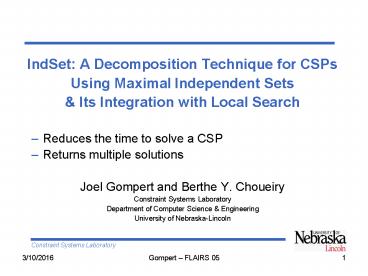IndSet: A Decomposition Technique for CSPs - PowerPoint PPT Presentation
1 / 28
Title:
IndSet: A Decomposition Technique for CSPs
Description:
IndSet: A Decomposition Technique for CSPs. Using Maximal Independent Sets ... PrefRelax [Junker, 04] 10/8/09. Gompert FLAIRS 05. 8. Constraint Systems Laboratory ... – PowerPoint PPT presentation
Number of Views:9
Avg rating:3.0/5.0
Title: IndSet: A Decomposition Technique for CSPs
1
- IndSet A Decomposition Technique for CSPs
- Using Maximal Independent Sets
- Its Integration with Local Search
- Reduces the time to solve a CSP
- Returns multiple solutions
- Joel Gompert and Berthe Y. Choueiry
- Constraint Systems Laboratory
- Department of Computer Science Engineering
- University of Nebraska-Lincoln
2
Main contributions
- IndSet, a new structural decomposition technique
- Combination with local search (LS)
- Heuristics for integration with LS
- Experiments showing
- Many solutions found
- Reduction in runtime
3
Robust solutions
- Single solution
- V1 d
- V2 e
- V3 a
- V4 c
- Robust solution
- V1 d
- V2 d, e, f
- V3 a
- V4 b, c
4
IndSet decompose
Decompose CSP into I I
5
IndSet solve
Solve I, using any technique
6
IndSet propagate
Apply DAC Revise(I, I)
- If no domain in I is empty, we have
- solved the original CSP
- found multiple solutions (cross product of
domains in I)
7
SLS/IndSet 5 heuristics
- All
- None
- Some
- Zero-domain
- PrefRelax Junker, 04
8
SLS/IndSet Results
9
SLS/IndSet Results
10
Finding dangles
- Identify T dangles
- Perform DAC T?I
- Apply SLS/IndSet on C I instead of on I
I - Extend to T, in parallel
11
Effect of dangles
- Reduces the size of the cutset
- Increases the number of solutions
- Slightly improves runtime
12
Number of Solutions Found
2
6
5
0
S
L
S
/
D
a
n
g
l
e
s
I
n
d
S
e
t
S
L
S
/
D
a
n
g
l
e
s
I
n
d
S
e
t
2
4
S
L
S
/
I
n
d
S
e
t
D
a
n
g
l
e
s
4
5
S
L
S
/
I
n
d
S
e
t
D
a
n
g
l
e
s
S
L
S
/
I
n
d
S
e
t
S
L
S
/
I
n
d
S
e
t
2
2
4
0
2
0
Log of number of solutions
Log of number of solutions
3
5
1
8
3
0
1
6
2
5
1
4
2
0
1
2
T
i
g
h
t
n
e
s
s
1
0
T
i
g
h
t
n
e
s
s
5
0
1
0
1
5
3
.
3
3
.
5
3
.
7
3
.
9
4
.
1
3
.
1
3
.
0
4
.
0
5
.
0
6
.
0
7
.
0
8
.
0
9
.
0
C
o
n
s
t
r
a
i
n
t
r
a
t
i
o
C
o
n
s
t
r
a
i
n
t
r
a
t
i
o
13
Runtime Evaluation
14
Cycle-cutset vs. IndSet
- Cycle-Cutset leaves the graph with no cycles
DanglesIndSet
IndSet leaves the graph with no edges
15
Related work decompositions
- IndSet is
- A conjunctive decomposition Freuder, 95
- A special case of Cycle-Cutset Dechter Pearl,
87 - A backdoor variables technique Williams et al.,
03 - Produces multiple solutions Choueiry et al.,
95 - Similar to dependent variables in SAT Kautz et
al., 97
16
Future work (more in dissertation)
- Perform experiments on more problems
- real-world problems
- k-regular graphs
- Explore how to compactly represent all solutions
in a tree graph - Explore how to increase the robustness of
solutions - Investigate how to solve k-partite graphs
17
- Thank you for your attention.
- Research supported by CAREER Award 0133568 from
NSF. Experiments conducted on PrairieFire of the
Research Computing Facilities (RCF) of CSE-UNL.
Questions
18
- Additional slides
19
Outline
- Background
- IndSet
- Explorations
- NI clustered graphs
- Runtime variance
- Finding dangles first
- Recursive decomposition
- Using IndSet to find cycle-cutsets
- (and more in thesis)
- Related work future research
20
Run-time variance
Trial 1 Trial 2 Trial 3 Trial 4
Instance 1 8.74 9.02 4.77 38.71
Instance 2 27.01 27.89 4.97 4.63
Instance 3 8.99 8.98 4.48 8.70
Instance 4 4.10 53.60 17.16 8.72
SLS SLS/IndSetDangles
Row variance 67.83 24.02
Column variance 68.45 24.12
21
Finding dangles first
22
Recursive decomposition
A
Ia
B
I
I
Ib
C
Ic
- RecIndSet
- RecCliq repeatedly find remove cliques
23
Using IndSet to find cycle cutsets
24
Outline
- Background
- IndSet
- Explorations
- Related work future research
25
Effect of size of I
- Tightness 60
- Constraint ratio 3.3
Size of I Runtime (seconds) SLS / IndSet
0 147.20
32 4.86
41 1.64
26
Independent sets
Finding maximum independent sets is NP-hard
- We use polynomial-time CliqueRemoval Boppana
Halldórsson, 90
27
Background CSP
- Constraint Satisfaction Problem CSP
- P (V, D, C)
- Given
- V V1, V2, V3, , VN
- D Dv1, Dv2, Dv3, , DN
- C set of relations on subsets of D
- Question Can we assign a value to each variable
such that all constraints are satisfied? - (i.e., find a consistent solution)
28
CSP characteristics
- NP-Complete
- Binary CSP
- Constraint graph
- Constraint ratio
- Tightness































